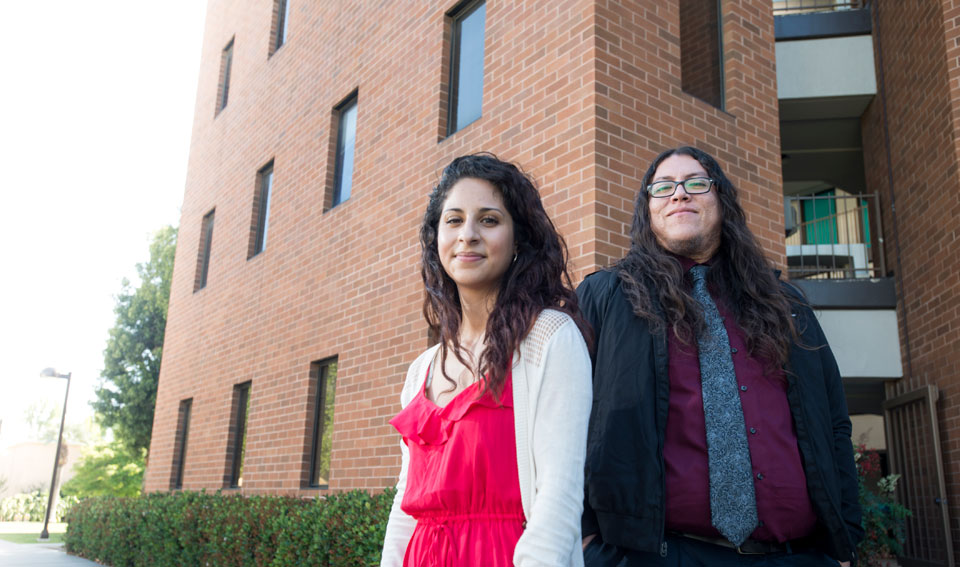New CSUN Office Provides Resources and Support for Undocumented Students

Student Daniela Barcenas and Dream Project Coordinator Dario Fernandez outside Santa Susana Hall, where the Dream Project's office is located. Photo by Lee Choo.
Some computers still sit in boxes hidden under desks. The walls are bare of any posters and the furniture still looks new.
But in the two months since California State University, Northridge opened the office of its Dream Project — which provides resources and support for CSUN’s estimated 1,000 undocumented students — the project’s staff and peer mentors have interacted with more than 300 students who’ve walked through the door and answered dozens of emails and phone calls asking for information and assistance.
“We just haven’t had time to really set up yet,” said Dream Project Coordinator Dario Fernandez with a rueful glance at a computer box sitting under his desk. “Our priority has been the students, making sure that we take the time to answer their questions and help them find the resources or support they need. We’re also conducting a needs-assessment survey to make sure that we are giving the students the support they actually need, not what we think they need. Housekeeping just hasn’t been at the top of our priority list.”
Though the official estimate of undocumented students on campus is about 1,000, Fernandez admitted the number is probably higher, given students’ reluctance to reveal their immigration status, as well as fears they could jeopardize themselves or their families.
The Dream Project office is a safe haven for CSUN’s undocumented students, a place where they can learn how to navigate the university’s bureaucracy; get information about financial aid — including campus scholarships specifically for undocumented students — and other services available to them under California Assembly Bill 540, which grants qualifying undocumented students the right to attend college in the state and pay in-state tuition; or find a sympathetic and knowledgeable person to talk to about problems or issues they are facing.
“The Dream Project at CSUN serves two very important roles,” said Juana Mora, assistant to the provost for diversity initiatives. “First, it will provide a safe, confidential space for undocumented students to get the information and support they need. Second, the project coordinator, Dario Fernandez, will be able to provide current training and information to the campus community about the needs of these students so we can all support their efforts. I am very pleased that CSUN has made a commitment to support all of our students, including those who come to us from many countries and who are undocumented.”
Fernandez pointed out that contrary to stereotypes, not all the students served by the project are Latino.
“We have students who are Persian, Ethiopian, Filipino, Vietnamese … they come from all over the world,” he said. “They all have questions, and it’s our job to help them find the answers. For some of these students, this is the first time they’ve been able to talk to someone who understands where they are coming from.”
Daniela Barcenas, 23, of Oxnard, is a graduating senior studying political science and Chicana/o studies. She works as a peer mentor for the project and has long been an advocate for undocumented students on campus. She said she has been struck by how little the students — and even faculty and staff — know about what rights and opportunities the undocumented students have.
“Most of these students are first-generation college students, so they are trying to figure out the college experience while at the same time struggling to deal with the obstacles created by their undocumented status,” Barcenas said. “When you add on the lack of information or misconceptions that are out there, it just makes it all very frustrating.
“But it’s so important that the project is here,” she said, “so that students have a place to go to find help where they feel safe, and faculty and staff have a place to go to get the right information.”
Fernandez said he plans to use input from the students the project serves to shape its future.
“The only way we can remain relevant and successful is to ask our students,” he said.
In the meantime, Fernandez is looking to set up programs that help students with financial literacy, develop a centralized list of vetted legal organizations that can offer the students and their families advice and even a car pool program that can ease the time it takes many of the students, who often rely on public transportation, to get to school.
“Some of the things we are looking at are very practical, while others are more complex — like how to make the educational experience for these students easier — but the bottom line is, we’re to help these students succeed,” he said.

 experience
experience